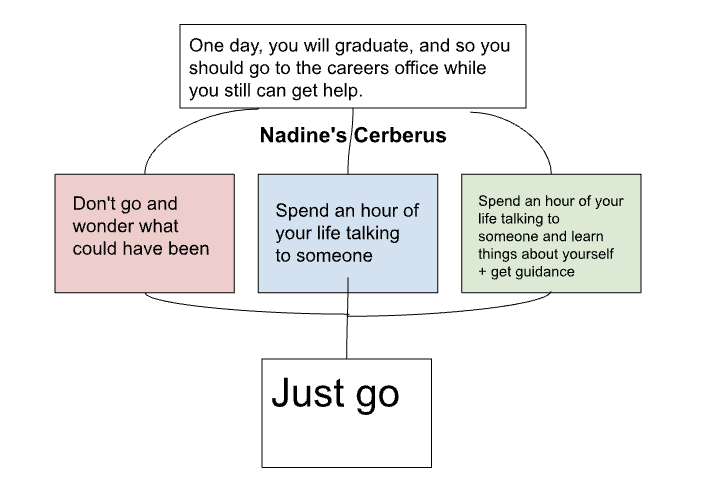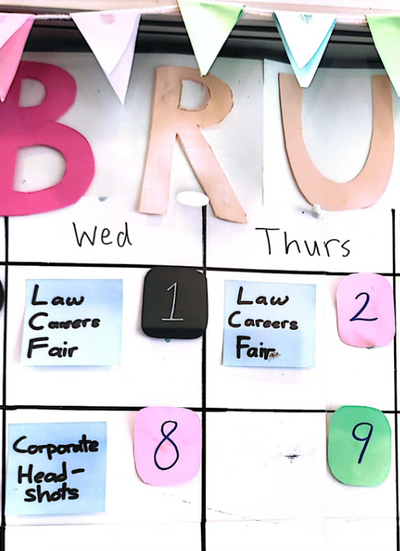*All names have been changed for privacy.
"Honestly, I was starting to fear that I'd never get a TC," James*, a current Y4, says.
"Neither my academics nor my extracurriculars are good. It's so shameful to not have one at the old, old age of Year 4—but I couldn't talk to anyone about it."
The first round of applications—the usual flood that happens in Year 3 Sem 1—came and went. Pressure built up. James was flanked on all fronts.
His parents were guilting him for 'already failing before he'd even started', he was personally dispirited for not having clinched a TC yet. The people around him were snatching up TCs left and right. Him? Not at all.
James ended up securing his training contract at the end of Year 4 Sem 1, but he hasn't forgotten 'the bone-deep humiliation of the experience'.
For those new to training contracts, here's a lightning-speed summary: A training contract, or TC, is something Law students generally acquire at the beginning of Year 3, that acts as a return offer for a student to come back after graduation to train.
(This explanation doesn't account for the current moratorium, by the way. For more information about the moratorium, please check the relevant sources.)
If a student graduates in May, they'll take the bar around Decemberish, and start the training period in January of the following year. The current training period is a year long. The long and short of it is: Students want training contracts because they want to practice law, and, by extension, be employed. Training period applications are usually at the end of students' Year 2 summer vacations. This is why Law students usually do multiple internships in their Year 2 summers—so that when training contract application season rolls around, they're prepared with their resumes, CVs, and whatnot.
And if you're not new to training contracts: Welcome back.
Reassurance Sought, Reassurance Found
At a firm I intern with, I end up talking training contracts with an associate. She's a cool 30-something who shows me how to use the SAL's civil procedure practice guides—in that she opens up the book and guides me through finding what I need for the memo I'm drafting.
Later in the day, we queue up for lunch. Inevitably, I babble to her, "I'm so worried about getting a TC."
Talking about training contracts—and honestly, talking about everything related to jobs, things like internships and the like—is like having diarrhoea. No one wants to hear about it, we would rather not have to, and it just sucks.
And yet, we must.
The associate is, obviously, nice about it. She says things like: "Dude, seriously, don't worry about it", and "Everyone worries about it, but it'll be fine".

Obviously, she's right. I know that training contracts are obtainable. Offers won't fall out of the sky, but neither are they perched so high in the stars that I should fear never getting one. But beneath that logical belief is a hysterical, quaking fear that I'm falling behind.
There's no such thing as an unemployment list, but I'm sure if there were one, my name would be first up.
For one, I don't have a training contract yet. I woke up and realized I'm turning 23 this year—maddeningly, I'm a geriatric Year 3 with no training contract.
The author admits that it's for a lack of trying—if we're being honest here, I thought I wasn't going to practice the law at all. So, while my classmates interned at firms and seized training contracts held between their teeth, I thought my life was going in a different direction.
I've since changed my mind, for reasons I won't go into here because this is Justified and not my personal blog. But there's no shame in changing your mind if you've thought things through. Seriously.
I've seen everyone around me worry about training contracts. I know what goes into the process, and I know that it's actually quite a reliable one. Put in effort and results should pop out the other end.
And still, I'm not above training contract anxiety—no one is. How could we be?
"You Should Worry"
Faith*, a current Y4, intends to apply for her training contract this summer—that is, after she graduates. She's never been too fazed about her training contract—she says it was very much "out of sight and out of mind" for most of her Y3 and Y4 life.
"I wasn't that worried about the fact that I didn't apply," she says. "But later on, I did get concerned that I didn't have a plan (...) especially when everyone else seemed to have one."
My own understanding of Faith's circumstances, as well as the other schoolmates who kindly agreed to talk about their TC experiences for this article, is that the TC is really more than a post-grad job offer. It's a sobering shadow standing in the hallway of collegiate intoxication.
It's a commitment, a plan, and you know what they say about Gen Z and commitment.

Personally, I think about my upcoming TC application season the same way I think of taking an intensive mod: It's probably going to be a lot of work in a very short period of time. I'll have to keep well-hydrated throughout.
But when the season's over, I'll be able to look back on it and say: Hey, I learned something. (Reminder to self: Remember to fill out the course eval form for that intensive mod.)
Forebears
Kylie*, who is currently a trainee and two years above me, applied for training contracts like crazy after she graduated. She was relieved when she finally received an offer from the firm she's currently training at, but she has this to say: "I felt like I could've avoided years of worry if I'd taken action earlier."
She'd put off applying for training contracts year after year, feeling like it was never quite the right time or that circumstances weren't ever quite in her favour. Finally, necessity pushed her to do it post-graduation.
What followed was a mad rush of interview prep and interviews—all while her friends were going on graduation trips and otherwise enjoying the post-grad glow.
"If you've been putting off applying, then try to understand why," she advises. "A TC isn't gonna drop from the sky if you just wait there."
"No one knows you, so you have to make them know you—go and apply. Even getting rejected feels better than doing nothing."
The Only Person In BTC
I had a few working titles for this article:
- Hey, What's the Deal with Training Contracts?
- Eternal Contract of the Training Mind
- A TC Application Walks Into The Bar
Ultimately, I settled on "The Only Person in BTC With No Training Contract". The person, of course, refers to myself.
In a more abstract sense, I suppose, it also refers to everyone who's ever applied or is going to apply for a TC. When you don't have a TC and everyone else does, you really, truly, do feel like the only person in BTC—or, better yet, the world—without a training contract.
You're in BTC with no TC. You're just a B.
But you have to remember that people just prefer discussing their triumphs over their struggles and defeats, and TCs aren't any exception. And since we tend to only confide in our closer friends, if you just listen to chatter in the hallways and gossip on the streets, you walk away thinking everyone is doing great.
One of my batchmates, who helped me read over this article, comments: "People don't talk about the fact that they might just have barely eked out of a TC. Or that they got their 7th or 8th choice, or that they have misgivings about their firm or practice area."
"More importantly," he says, "A TC is only the first step (and often, not even that important a step!) in a very long journey. But yeah, in the moment, you feel completely alone."
And it's funny, because so much of the stress over TCs might be self-imposed. Despite what people might say about law school and its assumed competitiveness-slash-toxicity, Faith thinks that the people around her helped her the most when it came to figuring out her future. Any negativity was more intrinsic than anything.
"Hearing about other people's plans helped—or forced me—to think about my own. They've been really kind and helpful—in fact, some of my friends really pushed me to get out of my stupor and properly think about applying for stuff."
Sometimes, your biggest enemy really might be yourself. No one is out there publicly shaming you for not having a TC. It's all you, baby! It's you—you who convinces yourself that you're alone in your stressed out stupor, who tells yourself that your life is going nowhere.
Not to belabour the diarrhoea metaphor, but TC-related stress and sadness really is like diarrhoea. It sucks, it's not fun, but we'll still clean up nicely.
Advice
"You might be applying late, but don't close yourself off to any opportunities," Kylie says. "Don't be afraid to apply to what you like, even if they seem beyond your reach—things like Big 4 firms or popular departments in popular firms."
"And if you've been putting it off, then try to understand why you've been doing that. What exactly are you afraid of? You have to be brutally honest with yourself."
She pauses, and then tells me: "Some of your readers probably still won't stop procrastinating after reading this article."
A laugh. "It's okay. All the best, and don't fret."
Not to rip off Manchester City or United or whatever that team is, but you'll never walk alone.
The writer would like to thank Faith, James, and Kylie for speaking to her about their experiences with their training contract applications. Details and names have been changed for their privacy.






